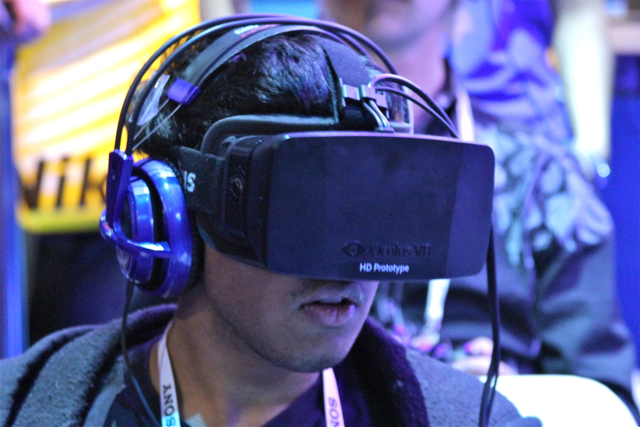Two virtual reality headsets are generating the most attention at the E3 confab in Los Angeles this week — Facebook’s Oculus Rift and Sony’s Project Morpheus. Both are expected to launch commercially during 2015, and may represent a significant business opportunity for producers of immersive entertainment. In addition to the gaming community, Hollywood is expressing strong interest. In fact, many media producers see VR as the next big revolution in entertainment.
“The next generation (of entertainment) is less restrictive, more immersive. That’s why there’s so much interest in VR. And that’s exciting for the next generation of storytellers,” said Ted Schilowitz, a futurist for 20th Century Fox, noting that entertainment is ready to “expand beyond the rectangle (shaped screen).”
As the VR hardware becomes more sophisticated, there will be a greater need for compelling content.
“Initially, there will be a chicken-or-the-egg situation between the installed base and the available games and other VR experiences,” writes Carolyn Giardina for The Hollywood Reporter. Cevat Yerli, founder and CEO of video game company Crytek, “pointed out that there needs to be an installed base before many companies will invest in developing an Oculus Rift game, as opposed to the safer route of creating a PlayStation or Xbox One title.”
“The installed base needs to be at least one million units,” Yerli suggested.
“VR is expected to go beyond gaming to training, education and other simulations, as well as narrative content,” explains Giardina. “In Hollywood, for instance, Fox is already known to be exploring VR experiences based on their upcoming films ‘The Maze Runner’ and ‘Wild,’ as well as ‘Night at the Museum’ franchise.”
“EVE: Valkyrie” is a VR game that Oculus is producing with CCP Games for the launch of the Oculus Rift. Other VR titles being previewed this week at E3 include “The Assembly” from UK-based nDreams, and “ADR1FT” from 505 Games and Three One Zero.
New hardware is also on display. Control VR is developing a control device involving a pair of gloves that can be teamed with a VR headset. The startup aims to have a developer kit available before the end of the year.
Oculus founder Palmer Luckey told Stuff that he is excited to see other companies exploring VR possibilities. He also explained that Oculus is working with other game studios and should have some demos by next year’s E3. Interestingly, Luckey noted that the Oculus Rift would be sold at cost.
“That’s one of the things the Facebook deal has allowed us to do: because we already have these resources behind us, we don’t have to worry about making money from our customers right away,” he said. “If we were running purely on our own and trying to make money just from hardware, we would need to make enough profit from each unit to pay for running the company for several years, until we launched the next one.”
In a private room at E3, Sony’s VR demo for Project Morpheus focused on “Street Luge,” a new racing simulator that Engadget describes in great detail, and an updated version of “Castle,” which debuted at the Game Developers Conference earlier this year.
During its review, Engadget points out that VR technology is about to go mainstream and studios are in discussions with Sony to create new VR experiences, although 2014 may be too soon to see the results.
“We don’t have quite the number of experiences that we feel would be a good value for people to buy some special hardware for it,” explained Richard Marks, Sony’s senior director of research and development.
The article suggests that “approachability and ease of use” will be “the key to making VR a mainstream product and a profit driver for the company. As Marks explained, Sony’s vision for the consumer model is simple: ‘[You] just basically hook it up, plug it in, put it on and you’re able to get into VR. We really want to make it this an easy experience for people.’”


No Comments Yet
You can be the first to comment!
Sorry, comments for this entry are closed at this time.